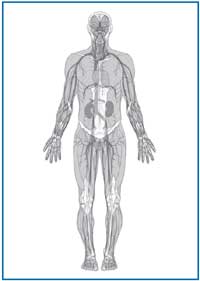Diabetes Dictionary: U - Z
A
B
C
D
E
F
G
H
I
J
K
L
M
N
O
P
R
S
T
U
V
W
X
The Diabetes Dictionary
U
UKPDS:
see United Kingdom Prospective Diabetes Study.
ulcer (UL-sur):
a deep open sore or break in the skin.
ultralente (UL-truh-LEN-tay) insulin:
long-acting insulin. On average, ultralente insulin starts to lower blood glucose within 4 to 6 hours after injection. It has its strongest effect 10 to 18 hours after injection but keeps working 24 to 28 hours after injection. Also called U insulin.
unit of insulin:
the basic measure of insulin. U-100 insulin means 100 units of insulin per milliliter (mL) or cubic centimeter (cc) of solution. Most insulin made today in the United States is U-100.
United Kingdom Prospective Diabetes Study (UKPDS):
a study in England, conducted from 1977 to 1997 in people with type 2 diabetes. The study showed that if people lowered their blood glucose, they lowered their risk of eye disease and kidney damage. In addition, those with type 2 diabetes and hypertension who lowered their blood pressure also reduced their risk of stroke, eye damage, and death from long-term complications.
U-100:
see unit of insulin.
urea (yoo-REE-uh):
a waste product found in the blood that results from the normal breakdown of protein in the liver. Urea is normally removed from the blood by the kidneys and then excreted in the urine.
uremia (yoo-REE-mee-ah):
the illness associated with the buildup of urea in the blood because the kidneys are not working effectively. Symptoms include nausea, vomiting, loss of appetite, weakness, and mental confusion.
urine:
the liquid waste product filtered from the blood by the kidneys, stored in the bladder, and expelled from the body by the act of urinating.
urine testing:
also called urinalysis; a test of a urine sample to diagnose diseases of the urinary system and other body systems. In people with diabetes, a doctor may check for
1. Glucose, a sign of diabetes or other diseases.
2. Protein, a sign of kidney damage, or nephropathy. (Also see albuminuria.)
3. White blood cells, a sign of urinary tract infection.
4. Ketones, a sign of diabetic ketoacidosis or other conditions.
Urine may also be checked for signs of bleeding. Some tests use a single urine sample. For others, 24-hour collection may be needed. And sometimes a sample is "cultured" to see exactly what type of bacteria grows.
urologist (yoo-RAH-luh-jist):
a doctor who treats people who have urinary tract problems. A urologist also cares for men who have problems with their genital organs, such as impotence.
[Top]
V
vascular (VAS-kyoo-ler):
relating to the body's blood vessels.

Vascular system
vein:
a blood vessel that carries blood to the heart.
very-long-acting insulin:
a type of insulin that starts to lower blood glucose within 1 hour after injection and keeps working evenly for 24 hours after injection. See glargine insulin.
very-low-density lipoprotein (VLDL) cholesterol:
a form of cholesterol in the blood; high levels may be related to cardiovascular disease.
vitrectomy (vih-TREK-tuh-mee):
surgery to restore sight in which the surgeon removes the cloudy vitreous humor in the eye and replaces it with a salt solution.
vitreous (VIH-tree-us) humor:
the clear gel that lies behind the eye's lens and in front of the retina.
VLDL cholesterol:
see very-low-density lipoprotein cholesterol.
void:
to urinate; to empty the bladder.
[Top]
W
wound care:
steps taken to ensure that a wound such as a foot ulcer heals correctly. People with diabetes need to take special precautions so wounds do not become infected.
[Top]
X
xylitol (ZY-lih-tall):
a carbohydrate-based sweetener found in plants and used as a substitute for sugar; provides calories. Found in some mints and chewing gum.
[Top]
Diabetes Dictionary Index
A
B
C
D
E
F
G
H
I
J
K
L
M
N
O
P
R
S
T
U
V
W
X
The Diabetes Dictionary
[Top]
National Diabetes Information Clearinghouse
1 Information Way
Bethesda, MD 20892–3560
Phone: 1–800–860–8747
TTY: 1–866–569–1162
Fax: 703–738–4929
Email: ndic@info.niddk.nih.gov
Internet: www.diabetes.niddk.nih.gov
The National Diabetes Information Clearinghouse (NDIC) is a service of
the National Institute of Diabetes and Digestive and Kidney Diseases (NIDDK).
The NIDDK is part of the National Institutes of Health of the U.S. Department
of Health and Human Services. Established in 1978, the Clearinghouse provides
information about diabetes to people with diabetes and to their families,
health care professionals, and the public. The NDIC answers inquiries, develops
and distributes publications, and works closely with professional and
patient organizations and Government agencies to coordinate resources
about diabetes.
Publications produced by the Clearinghouse are carefully reviewed by both NIDDK scientists and outside experts.
This publication is not copyrighted. The Clearinghouse encourages users of
this publication to duplicate and distribute as many copies as desired.
NIH Publication No. 04–3016
November 2003
[Top]
|




